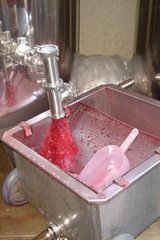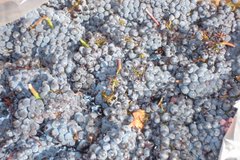
Winemakers vow to fight shipping bill
Bill Daley
August 15, 2007
Some sour grapes are fermenting over a new Illinois bill governing the direct shipment of wine to retailers and consumers. The state's largest wineries claim the legislation, which was passed by both the House and Senate, discriminates against them. And they vow to fight.
"We're surviving a bitter defeat," said Fred Koehler, president and chief executive officer of Lynfred Winery in Roselle. "You can bet your last dollar we'll be back in Springfield."
Bill Daley
August 15, 2007
Some sour grapes are fermenting over a new Illinois bill governing the direct shipment of wine to retailers and consumers. The state's largest wineries claim the legislation, which was passed by both the House and Senate, discriminates against them. And they vow to fight.
"We're surviving a bitter defeat," said Fred Koehler, president and chief executive officer of Lynfred Winery in Roselle. "You can bet your last dollar we'll be back in Springfield."
The new law, which was passed by the Senate last week and now awaits the governor's signature, would allow smaller wineries making under 25,000 gallons of wine -- that's 98 percent of all the state's wineries -- to sell up to 5,000 gallons (about 2,100 cases) directly to stores and restaurants. Larger wineries that make more than 25,000 gallons have to sell via wholesalers. Currently, they can sell up to 10,000 gallons to retailers and restaurants.
For Illinois consumers, though, one of the biggest changes will be that they can now buy up to 12 cases of wine per person per year directly from any Illinois winery; same holds for buying from out-of-state wineries that obtain the necessary permits. The old law allowed unlimited shipping of wine by Illinois wineries to state residents but limited to two cases the wine that could be sold directly to Illinois consumers from wineries in states that had so-called reciprocal shipping privileges with Illinois.
Ted Penesis, industry education manager for the Illinois Liquor Control Commission, said that most out-of-state wineries doing business in Illinois are expected to apply for a direct shippers license. Buying wine directly from the winery should ultimately result in a cost savings for consumers, he said.
Retailers in Illinois can continue to ship wine to customers across the state. But Illinois residents won't be able to purchase wine from out-of-state stores (including online businesses), brokers or auction houses as before.
The impact could limit consumer choice, said Tom Wark, executive director of the Specialty Wine Retailers Association. He said only allowing out-of-state wineries to ship wine to Illinois consumers could possibly trip up at least 500 California wine operations selling here that aren't officially licensed as wineries. Winemakers who lease space elsewhere or use facilities they do not own are licensed in California as "retailers" or "distributors," he said.
"They are locked out of Illinois," Wark claimed.
Paul Kronenberg, president of the Family Winemakers of California, wouldn't comment on whether Wark's numbers are correct.
"His point is valid in the sense innumerable wine producers are not considered wineries by Illinois and other states because they're not licensed as wineries in California," he said. "Choices will be limited."
Stay calm, Penesis advised.
"No rules have been drafted yet," he said. "To say specific wine operations in California would be locked out of Illinois would be incorrect."
Hector Cardinez, the governor's press secretary, wouldn't say whether Gov. Rod Blagojevich will sign the bill. "We need to review it first," he said.
If the bill is signed into law, its provisions would go into effect on July 1, 2008.
The impetus for changing Illinois law was a 2005 U.S. Supreme Court decision, Granholm v. Heald, involving the states of Michigan and New York. The justices ruled a state could not discriminate against out-of-state wineries when it came to direct shipping. In the wake of the ruling, states across the country have rushed to re-write their laws.
"We think this is a good result for the vast majority of Illinois wineries and consumers," said David Stricklin, lobbyist for the Illinois Grape Growers and Vintners Association. "We had to make sure we could ship directly to our customers and make sure the smallest, newest wineries could self-distribute in order to enter the market."
But Scott Lawlor, general manager of Galena Cellars Vineyard and Winery, said the new law is discriminating against him and other large wineries in the state. He said being forced to sell via a distributor will mean higher prices.
"It's going to cost restaurants 27.5 percent more," he said. "They probably won't buy from me anymore."
Lawlor said direct sales to retailers accounts for 20 percent of his business.
"This will really hurt us," he added. "We built our businesses up. Our families worked hard and now they're taking it away from us."
Roughly 40 percent of all wine produced in Illinois is made by Galena Cellars and Lynfred, Lawlor said.
Illinois' wine industry has experienced strong growth in recent years. There are now more than 68 wineries producing 500,000 gallons of wine per year, with an annual economic impact of $250 million, according to the Illinois Grape Growers and Vintners Association.
The non-profit organization supports the new legislation because it allows small wineries to continue with direct sales to retailers, said Nathan Kraft, an association spokesman. Small winery owners had feared they would be "locked out" because of their size if forced to go through the state's established three-tier distribution system, he said.
Koehler and Lawlor have now formed a group, the Illinois Winemakers Alliance, to fight the legislation. About a dozen wineries are listed as members on the alliance's Web site, illinoiswinemakersalliance.com.
"This is so unfair, we got buried," Koehler said.
"I understand their point of view," Stricklin said of the larger wineries. "I understand their disappointment and why they opposed the bill."
"With any membership-based organization you won't see 100 percent consensus," Kraft said. "This [bill] supports 98 percent of the wineries in Illinois. The [association] supports whatever benefits the majority."
But the two winemakers insist smaller wineries will eventually feel a pinch because they claim the bill punishes success. And Koehler vows to put heat on legislators who backed the bill.
"It's very plain who is for Illinois wineries," he said.






No comments:
Post a Comment